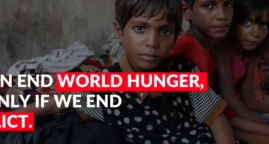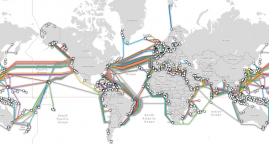Global Views on Immigration and the Refugee Crisis
Article published on The Financial Website on 09/15/2017
Three in four (75%) in 25 countries around the world believe that immigration has increased in their country over the last five years, according to new data from the Ipsos Global @dvisor survey.
The survey, conducted among online adults aged under 65 in 25 countries world-wide, finds that at least half of respondents in each country believe that the number of immigrants coming into their country has increased in the last five years. While overall perceptions are somewhat similar to last year (it was 78% in July 2016) there have been significant shifts in perceptions in several countries when considering the overall trend since 2011. For example, Germany and Sweden have seen the largest increase in the number of people thinking immigration has increased (up 22 and 24 percentage points from 2011 to 85% and 90% respectively).
Other findings from the survey include:
Perceptions about immigration are downbeat in many countries, with attitudes particularly negative in Turkey, Italy and Russia.
Over four in ten say immigration is causing their country to change in ways they do not like. Twice as many think immigration has had a negative impact on their country than positive.
One in five (21%) on average say that immigration has had a positive effect on their country compared with two in five (42%) who say it has had a negative impact. Saudi Arabia, India, and Britain are the most positive countries where two in five or more say immigration has had a positive impact. Turkey, Italy, Hungary and Serbia are most negative with at least three in five (58%) saying it has had a negative impact.
Britain and the United States are the two countries which have had the largest positive change since 2011. In Britain, two in five (40%) now say immigration has had a positive impact (up from 19% in 2011) while 35% in the US say the same (up from 18% in 2011). Sweden has seen the largest movement of people becoming more negative, with a quarter (25%) now saying immigration has been positive compared with 37% in 2011.
Half (48%) on average think that there are too many immigrants in their country. Turkey has the highest number of people thinking this (83%), followed by Italy (66%), South Africa (62%), and Russia (62%).
Just under half (44%), on average, say that immigration is causing their country to change in ways that they do not like. Again, those in Italy and Turkey were most likely to say this (77% and 63% respectively) while people in Brazil and South Korea were the least likely (23% and 24% respectively).
Most countries are concerned about immigration placing pressure on public services. In 17 of the 25 countries surveyed at least half said they agreed immigration is placing too much pressure on national public services.
On average half (49%) think that immigration has placed too much pressure on public services in their country, while just one in five (19%) disagree. Britain and Australia have seen the biggest decrease in the proportion of people agreeing to this since 2011 – down 20 points in Britain (now at 58%) and down 13 points in Australia (now at 51%). The largest increase is seen in Turkey – now at 73% (up from 45% in 2011), and in Sweden – at 56% (up from 40%).
When considering the economy 28% overall agree that immigration has had a positive impact (no change from 2016 or 2011). People in Saudi Arabia (50%), Britain (47%), and New Zealand (47%) tend to be most positive, while those in Serbia (8%), Russia (9%), and Hungary (9%) are least positive. Turkey (78%), Russia (64%), and South Africa (58%) are most likely to agree that immigrants have made it more difficult for people their country to find jobs, with those in Sweden (21%), Serbia (21%), and Japan (26%) the least likely to agree to this. Overall two in five (40%) say they agree priority should be given to immigrants with higher education and qualifications (no change from 2016). People in New Zealand (58%), Saudi Arabia (56%), and Britain (55%) are most likely to want to prioritise educated immigrants.
Only three in ten (31%) globally believe immigrants make their country a more interesting place to live, with the highest scores seen in Britain and New Zealand (both 49%). Britain has seen a significant change since 2011 (up 16 points), becoming much more positive. Serbia (8%), Russia (10%), and Hungary (10%) are the countries with the fewest people showing positive attitudes towards immigration’s cultural impact.
As the refugee crisis continues, the Ipsos research shows that a narrow majority still believe they should keep their borders open to refugees, however many still have serious security concerns.
Four in ten (39%) on average want to close their borders to refugees entirely (no change from 2016) while half (51%) disagree. Those in Turkey (63%) and Hungary (61%) are most likely to agree to such a move with those in Japan (21%) and Mexico (22%) least likely.
Three in five (59%) on average think terrorists are pretending to be refugees to get into their country. This belief is highest in Turkey and Russia (82% in both) while lowest in Spain (19%) and Serbia (36%).
A majority of people (53%) world-wide believe most refugees coming to their country are not really refugees, but economic migrants.
Only 43% on average are confident that refugees coming to their country will successfully integrate into their country, with Serbia (70%) and Peru (65%) being most confident.
Related Articles
We CAN end hunger but only if we end conflict
November 2017. The vicious cycle of conflict and hunger must be broken if we are to achieve a world where everyone has enough to eat.
Generating respect for the law in all armed conflicts
01/19/2017. With this issue, the Review wants to take stock of the lessons learnt in the field of influencing behavior and developing strategies for enhanced respect for the law
The impact of (big) data on geopolitics, negotiations, and the diplomatic modus operandi
05/09/2017? Today, as The Economist argued, data is the new oil. It is at the core of modern developments, and is increasingly shaping political and economic lives.





